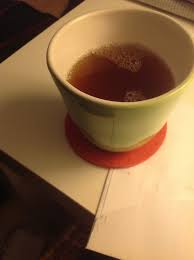
Was asked by a friend today what the ‘best tea’ was. What a question, eh? But I love a good debate. And blog comments. In case I’ve been unclear in the past, I really really like blog comments. So here’s my not-so-humble answer. I wonder how the rest of you might respond.
Many teabloggers focus on green and/or Oolong tea, but as much as I like them, I’ve focused more on black tea. Most tea sellers in Germany make their own unique Ostfriesen Blend that is often a mix of strong, malty Assam and a Chinese Keemun (and maybe an Indian Nilgiri). If I had to choose my favourite non-single estate tea, it’d be one of those specialty blends.
But if it’s brands we’re talking about, the tastiest and most consistent tea I’ve found is ‘Yorkshire Gold’ made by Taylors of Harrogate. But that’s only if we’re talking about black tea blends.
I’d say the best non-green/Oolong tea, in my opinion, is still a single estate Darjeeling (to be truly accurate, most ‘black’ Darjeeling is really only 90% oxidised, so it’s actuallyOolong). I like stronger tea, so I enjoy second as well as first flush Darjeeling.
But the best brand? If you’re buying from a seller that can tell you on which estate aDarjeeling was grown, then the likelihood is that it’ll be better than something labeled simply as ‘Darjeeling’. The estimation is that 40,000 tonnes of Darjeeling are sold worldwide, while only 10,000 tonnes are grown. Logically, one isn’t always entirely sure that purchased Darjeeling was actually grown there.
Again, I’m very grateful for the question. Clearly the answer you’ll get is entirely objective. I like thinking about how to make loose-leaf tea drinking more attractive. If I were a tea snob, it’d be the worst way of going about the whole thing.
What about you other tea obsessives? When someone asks you what the ‘best tea’ is, what might you say? I know on the face of it, it’s an impossible question. But please jump in and claim your stake on this issue.
Did I mention that blog comments are encouraged?

